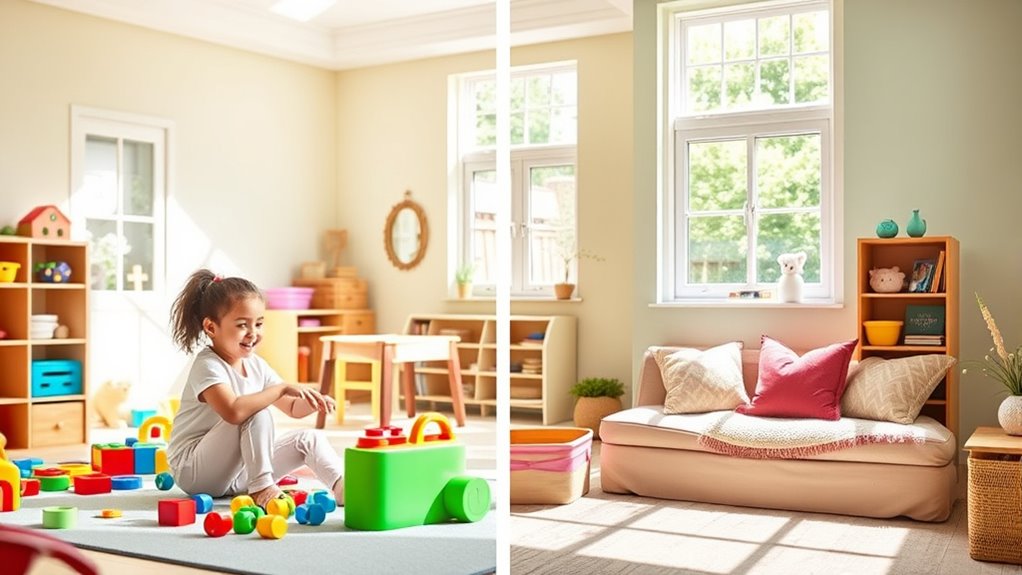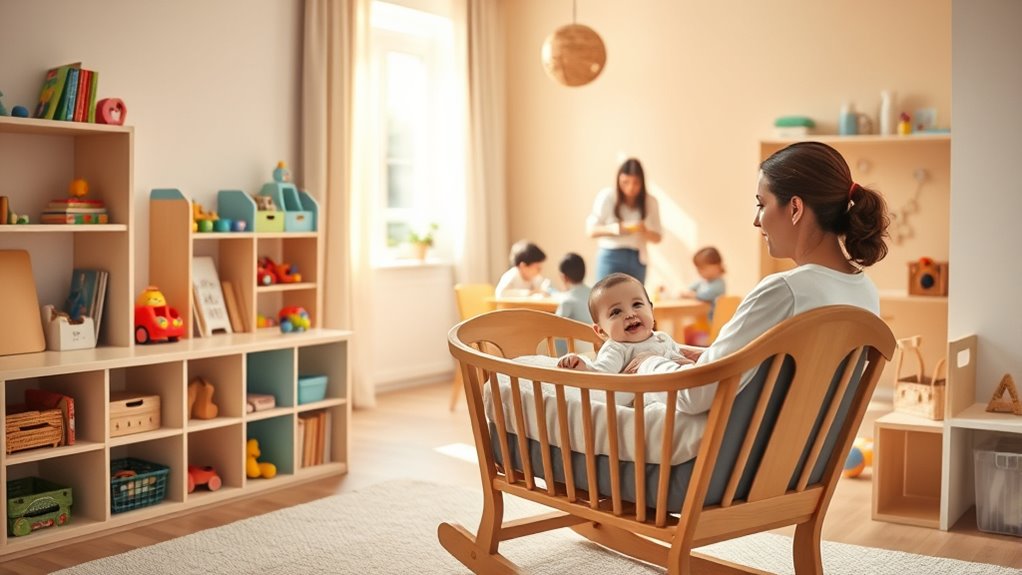When choosing childcare, consider your child’s needs, your schedule, and what matters most to you—whether it’s socialization in a daycare or personalized attention with a nanny. Daycares offer structured activities, peer interaction, and predictable hours, while nannies provide flexible schedules and tailored care. Think about safety standards, cost, and how each option supports your child’s growth. Keep exploring to discover more about how to find the best fit for your family.
Key Takeaways
- Consider your child’s social needs: daycare fosters peer interaction, while a nanny offers personalized, one-on-one attention.
- Evaluate your schedule flexibility and budget; daycares provide predictable hours, whereas nannies offer tailored care.
- Assess safety and regulatory standards to ensure a secure environment, regardless of the childcare option chosen.
- Think about developmental activities: structured routines in daycare support milestones, while nannies customize activities for individual growth.
- Visit providers and inquire about their approach to child development to select the best fit for your child’s needs.

Are you feeling overwhelmed by the options when it comes to choosing childcare? It’s a common feeling, especially with so many factors to consider. One of the first things to think about is how the environment will support your child’s growth. Playgroup activities are a great starting point. These activities aren’t just about keeping your little one busy; they’re carefully designed to promote essential skills that align with child development milestones. When you visit a daycare, ask about the types of playgroup activities they offer. Do they include sensory play, arts and crafts, or story time? These activities help your child develop cognitive, social, and motor skills, all vital for their early growth.
Understanding how a childcare setting supports your child’s development can make your decision clearer. Daycares often have structured routines that incorporate playgroup activities tailored to different age groups. These routines can help your child reach milestones such as improved language, better coordination, and social confidence. On the other hand, if you’re considering a nanny, think about how they can facilitate similar developmental opportunities. A nanny can personalize activities to suit your child’s specific needs and interests, often providing a more flexible schedule. This personalized attention can be especially beneficial when your child is working on particular milestones or needs extra support.
While playgroup activities are important, the overall environment matters too. With a daycare, your child will have the chance to interact with peers regularly, fostering social skills like sharing and teamwork. This peer interaction is integral to reaching social and emotional milestones. Conversely, a nanny offers one-on-one interaction, which can be advantageous for children who thrive on individual attention or need help with specific developmental challenges. Consider how your child responds to different social settings and whether they would benefit more from group experiences or focused, personalized care.
Additionally, understanding the importance of legal and regulatory compliance, such as asset division laws, in childcare and related sectors can ensure you are well-informed about your options and protections. Consider how your childcare provider adheres to safety standards and licensing regulations to support your child’s well-being.
Cost, convenience, and your own schedule are also key factors. Daycares tend to be more predictable in hours and often have additional resources like trained staff and educational programs. Nannies, however, provide more flexibility and can adapt to your family’s routine, possibly offering more tailored activities to support your child’s progress toward key development milestones. Whichever option you choose, keep in mind how it will support your child’s growth and learning. Visiting potential providers and asking about their approach to playgroup activities and developmental milestones can help you make an informed decision that best suits your child’s needs and your family’s lifestyle.
Conclusion
Deciding between daycare and a nanny depends on your family’s unique needs, but remember, about 70% of parents find that personalized care from a nanny boosts their child’s development. Whichever option you choose, prioritize safety, comfort, and your child’s happiness. Trust your instincts and consider your schedule and budget. Ultimately, the right choice creates a nurturing environment where your little one can thrive and explore the world around them.










